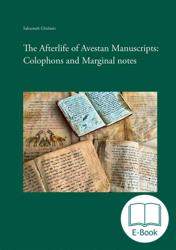This study investigates the role of paratext in Zoroastrian scribal tradition, with a focus on the Avesta manuscripts. It examines how paratexts, such as colophons and marginal notes, contribute to organizing and interpreting the content of these manuscripts. These elements not only structure the knowledge but also reflect the roles and activities of individuals involved in the manuscript's lifecycle, from creation to reception. Additionally, the study explores how paratexts facilitate access to the main text, acting as a bridge that documents the history of each manuscript, its actors, and interaction with society. The analysis includes a diverse range of colophons and marginal notes, examining their structure, content, and relationship
to their respective manuscripts.
This study focuses on the role of paratext in the context of Zoroastrian manuscripts. The emphasis is on how paratexts contribute to structuring, organizing, and commenting on the knowledge contained in the Avesta manuscripts. It also highlights how they reflect the activities of scribes, commentators, readers, sellers, and owners in the process of production, transmission, dissemination, and reception of the manuscripts and their contents.
The study examines how paratexts enable access to the main text by highlighting their role as a transitional zone that documents the spatial and temporal dimensions of the manuscript production process and reveals the history of each individual Avesta manuscript. In addition to colophons, which are a primary component of the paratext, marginal notes are also examined. These notes can be comments, annotations, statements, contracts, or corrections typically written by later readers or scribes into the margins. The selection criteria for the chosen colophons and marginal notes include diversity in
structure and content, as well as the relationship between specific manuscripts and their respective colophons and marginal notes.
Saloumeh Gholami, born in 1979 in Tehran, is a Professor of Minority Languages in the Middle East at the Institute for Empirical Linguistics at Goethe University Frankfurt. Her expertise lies in the areas of minority languages and cultures, language documentation, and codicology.


 Preface
Preface